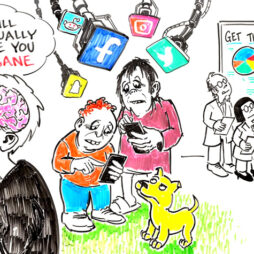5/12/2010 – Nick Morgan –
Tell one of these, and you’ll always succeed.
The culture we’re all immersed in together gives you a great gift as a presenter–a wealth of stories that already lie deep in any audience’s consciousness. Use these stories to give your speeches power and to connect immediately and deeply with your audience.
There are five of these basic stories: the quest, the stranger in a strange land, rags to riches, the love story and the tale of revenge. Each has its own structure and its own situations where it’s useful.
The Quest
We all love quests, because we always identify with the hero and we know how the story goes. We’re minding our own business and living a normal life until one day something comes along to overturn everything. The Empire kills our guardians, Auntie and Uncle, and we’re forced out of our comfortable surroundings to seek Obi-Wan Kenobi. Along the way, we usually pick up a mentor, someone who has an important skill like being able to fight with light sabers and who will train us in that skill. We go through a series of appalling adventures, tests and obstacles designed to reveal our worth. We persevere, because we know that at the end we will seize the prize, which is something really cool, like a Holy Grail, or a pot of gold, or a kingdom.
Quests are great stories for when you need your audience to work hard toward something, and you want to prepare them to overcome disappointment and persevere, not give up at the first challenge.
The Stranger in a Strange Land
The stranger in a strange land has been dropped into a new place, maybe a foreign country or a new planet, and he has to learn the rules, or the language, before events–or unfriendly locals–do him in. This story is all about mastery, and it’s a great one to tell if you’re confronting a new economy or a situation where the rules have changed and the old ways of doing things no longer work. The stranger-in-a-strange-land story prepares your audience to work hard to achieve mastery, not to get somewhere in particular, and to thrive in new, strange situations and conditions.
Rags to Riches
This story is known to anyone who has sung along to Annie or responded to a fairy tale about a plucky tailor who armed himself with a magic bean and some native intelligence, bested the giant and won the castle full of gold. It’s a great one to tell when you want to lead normal people down a road to success. Entrepreneurs and start-up companies live rags-to-riches stories so completely that they probably have no idea they’re embodying an ancient paradigm.
The Love Story
Boy meets girl, falls in love. Boy gets girl. Boy loses girl, usually because he acts like an idiot, and has to win her back. Girl forgives boy. They live happily ever after. The shape of this story is familiar to anyone who has watched a Hollywood romantic comedy or read a romantic novel. Love stories are everywhere in business today, because there are so many mergers, partnerships and joint ventures. All of them need to be romanced, and everyone involved has to learn to expect that there will be ups and downs along the way. They’re inevitable.
The Tale of Revenge
Revenge stories at once fascinate us and make us uncomfortable. They’re messy and deal with emotions we’d rather not admit to, but also they’re powerful. Revenge is a great way to get a team fired up and ready to compete against … that other team. The one that always plays a little dirtier than us. Or the one that is much more formidable on paper than us. Or the one we secretly fear.
If you can enlist your colleagues in a revenge story, they will stick with you to the end. The bitter, really satisfying end. But be careful. The best revenge stories turn out to involve someone you thought was your best friend or most trusted associate.
Use these stories to bring your audience rapidly to your point of view and your orbit. Don’t explicitly say you’re invoking them; just follow their ageless forms as you tell of the future you want your audience to embrace. They’re powerful because they’re so deeply a part the culture that your audience won’t recognize them if you invoke them artfully enough. Your listeners will just think what you’re saying is how it has to be.
So don’t ever simply say, “Let’s go on a quest.” Instead, say, “We’ve got a long way to go, but waiting for us at the end is an amazing pot of gold that we can all share….”
HT: Forbes



